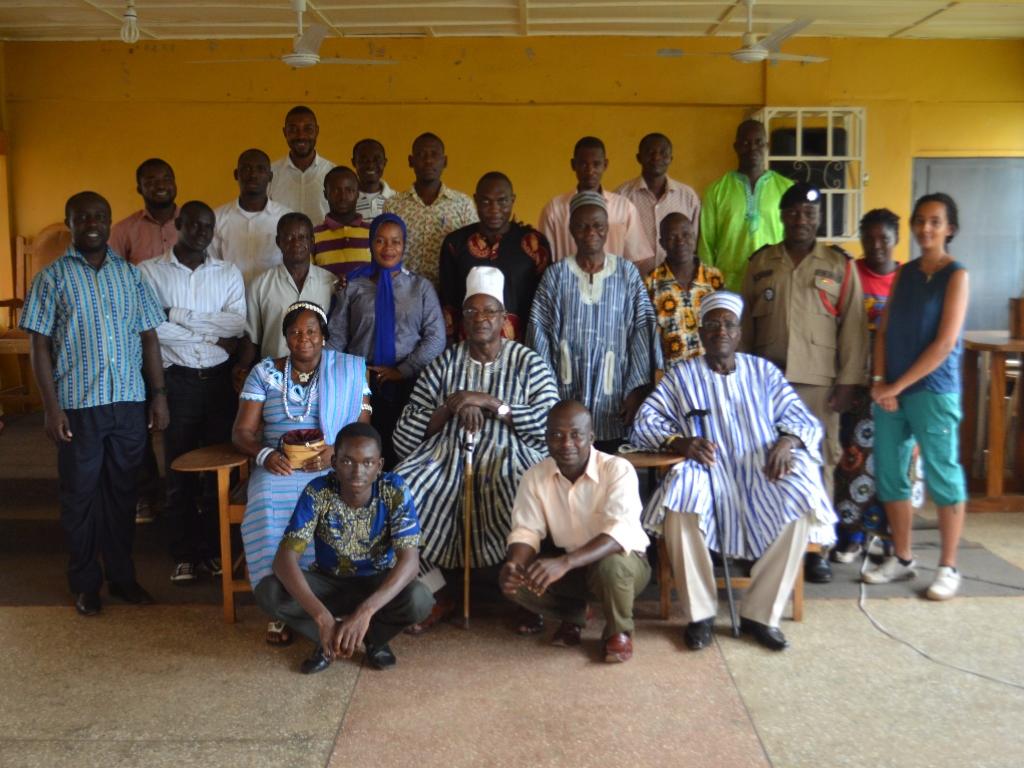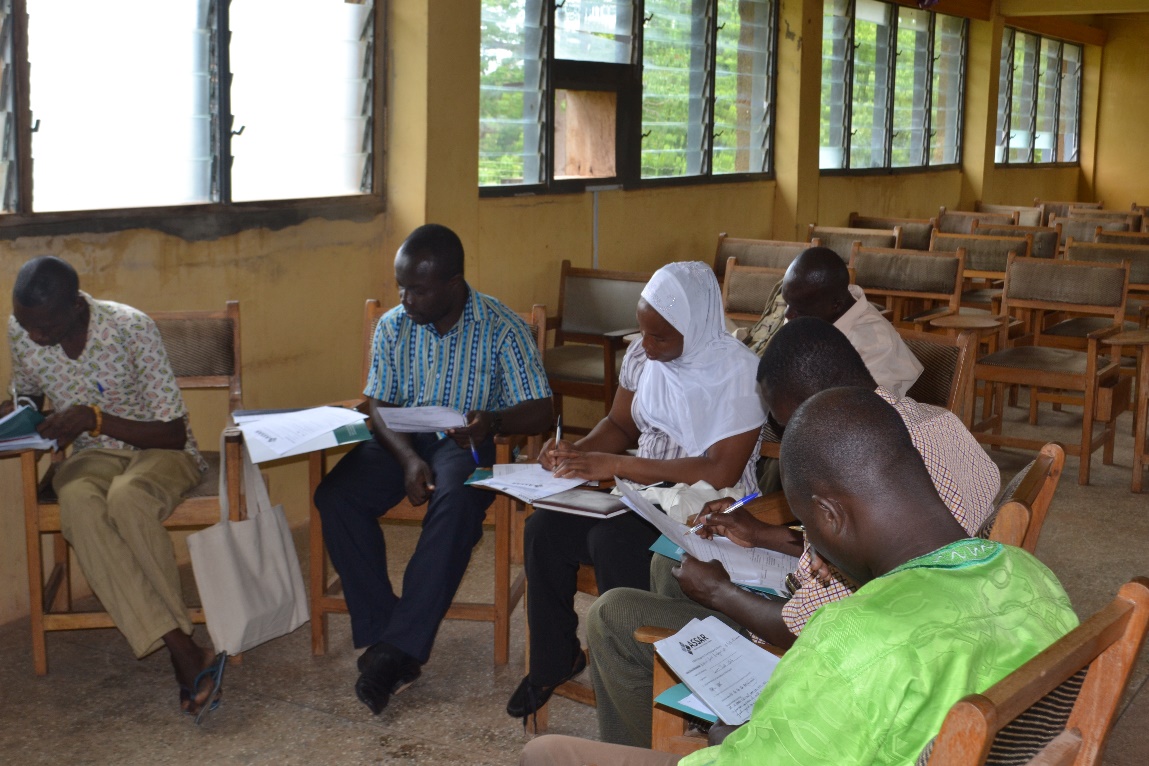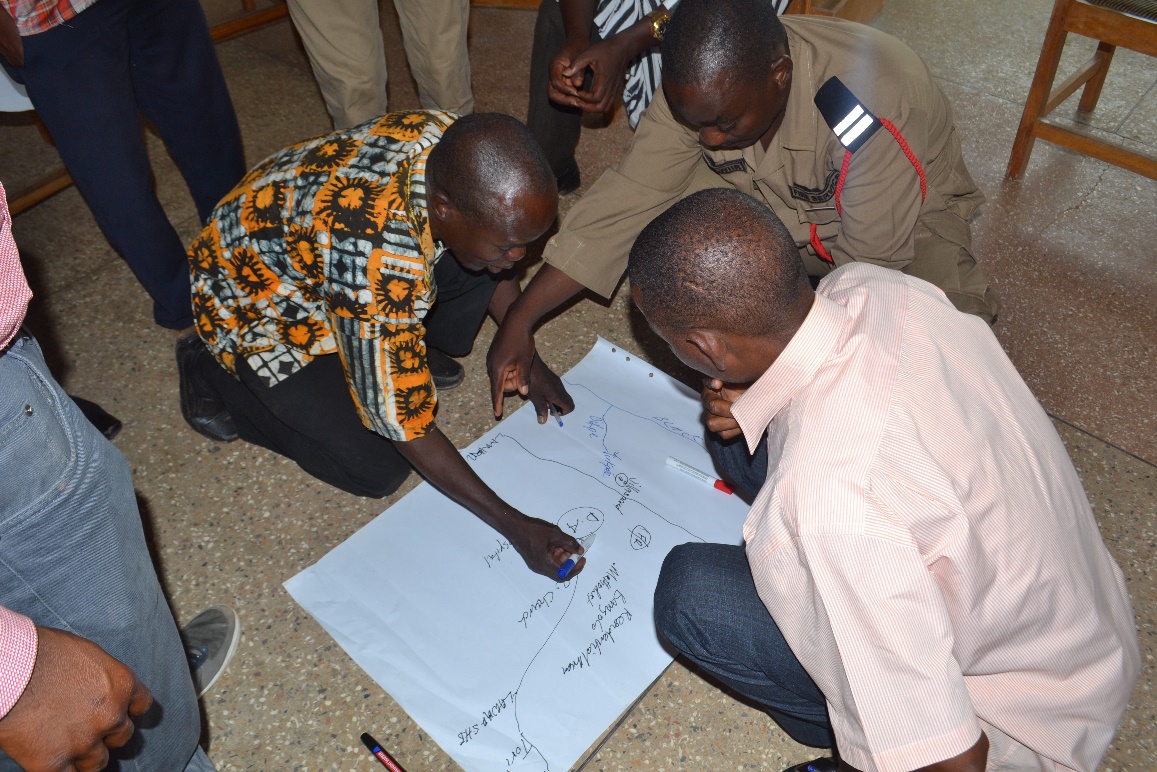Reflections on District level dissemination activities of the ASSAR West Africa Regional Diagnostic Study in Ghana

One of the major objectives of the ASSAR project is to engage stakeholders throughout its research process, in order to enable long term and successful approaches to climate change. This article is a summary of the second in the series of these interactions, with the main aim of disseminating and validating key results of the regional diagnostic study (RDS), a baseline survey of adaptation planning and strategies in Ghana and Mali.
A total of 48 stakeholders from the two participating districts in the semi-arid region of the Upper West of Ghana, Lawra and Nandom districts, met with the ASSAR West Africa team on the 22nd and 23rd July, respectively. Presentations given on the main research focus areas of the project, i.e., social differentiation, governance, information and dynamic change, elicited enthusiastic responses from the participants, especially towards identifying important issues to focus research on the coming years. This is a critical step in the research phase to ensure that the findings can be translated into usable and relevant information, for not only practice interventions in the communities, but to inform policy as well.
The diverse group of stakeholders included representatives from civil society groups, non-governmental organizations, farmers, traditional council and the civil service. Information on the identified key issues was presented to the group for validation and further discussions:
i) The vulnerability of communities to water and forest resources and agriculture yields
ii) Types of adaptation strategies that include improved seeds, fertilizers and tree planting
iii) Factors that hinder adaptation, such as unequal access to resources, fading traditional knowledge and high illiteracy that hinders adaptation
iv) Conditions that promote adaptation, such as the presence of NGOs, strong traditional leadership and formation of women and farmer groups

Photo credit: Prince Ansah. Focus group discussion
Towards the research phase
The research phase in the Upper West region of Ghana considers agricultural intensification with climate change as the core focus area for investigation. During the focus group discussions, the participants highlighted main issues under each of the focus areas, such as:
Social differentiation Social groups that are vulnerable to climate change in both districts include women, smallholder farmers, hunters and disabled persons. For instance, the ownership and control of farm lands by women is difficult even though both men and women are breadwinners of the household. In addition, the format and media of agriculture information are usually not beneficial to the disabled, especially the blind and deaf. An innovative approach to reach these groups with the right format and information will be key to ensuring equal opportunity for all social groups.
Governance Many district programmes incorporate adaptation during the implementation process but are limited by inadequate staff, logical challenges and inadequate funding. Unlike previous times, current adaptation policies designed at the national level include local level engagements. All district stakeholders including the traditional council, NGOs, government organizations and civil society groups are actively involved in the adaptation process. The current traditional governance system in Nandom district which has strict laws on bush burning and logging is a classic example of active local level stakeholder engagement.

Photo credit: Prince Ansah.Community structural mapping
Information Getting timely and accurate information in both districts is a major challenge. Most people in the districts are more interested in receiving information that relates directly to their occupation. For instance, farmers prioritize weather, credit and input information as their key information needs whilst market women are mostly interested in market prices and trends. Efforts are being made by non-governmental organizations (NGOs) such as Esoko Ghana and the West Africa Productivity programme (WAPP), which are exploring the use of mobile technology to provide smallholder farmers with timely and needed information.
Dynamic change There has been visible structural changes within both districts over the past 20 years. Participants could recall major structural changes within the districts, most especially, changes related to the access and use of lands. Issues of urbanization in Nandom Township have changed farmlands into development projects such as housing and school buildings. This situation has increased the cost of land for agriculture purposes which was previously leased or given out for free. Moreover land conflicts and litigations in both districts have also increased in recent times with the increasing prices.
Priorities and way forward
Participants in both districts recognized the need to strengthen food systems by helping farmers increase crop productivity and market by having access to information, credits and farm inputs. Stakeholders in Lawra districts were more particular about their vulnerability to water resources as this has resulted in numerous cases of farmer-herder conflicts. In Nandom district, the frequent bush burning activities which largely destroy farms and livestock is a major issue that needs to be addressed.
Moving forward, stakeholders must consider addressing climate change risks and vulnerabilities through integrated adaptation approaches that are successful in the long-term. The scope of stakeholders on climate change adaptation platforms should include the private sector, the media and the political structure within both districts. The collaboration among NGOs and with government agencies should be highly encouraged for the sustainability of projects as past interventions have shown poor exit strategies. Finally, the Research into Use component of the project needs to consider the best approaches of dissemination that meet the needs of the intended audience as well as the kind of information relevant to the each end-user. Across the wide range of stakeholders, careful selection of information type, approaches and timing are imperative if ASSAR is to make significant impact on the ground.